Known as Ajitsuke Tamago or Ajitama in Japanese, Ramen Eggs are delicious as a topping on ramen or enjoyed as a snack. Learn to make these flavorful, perfect soft-boiled eggs with just five ingredients!
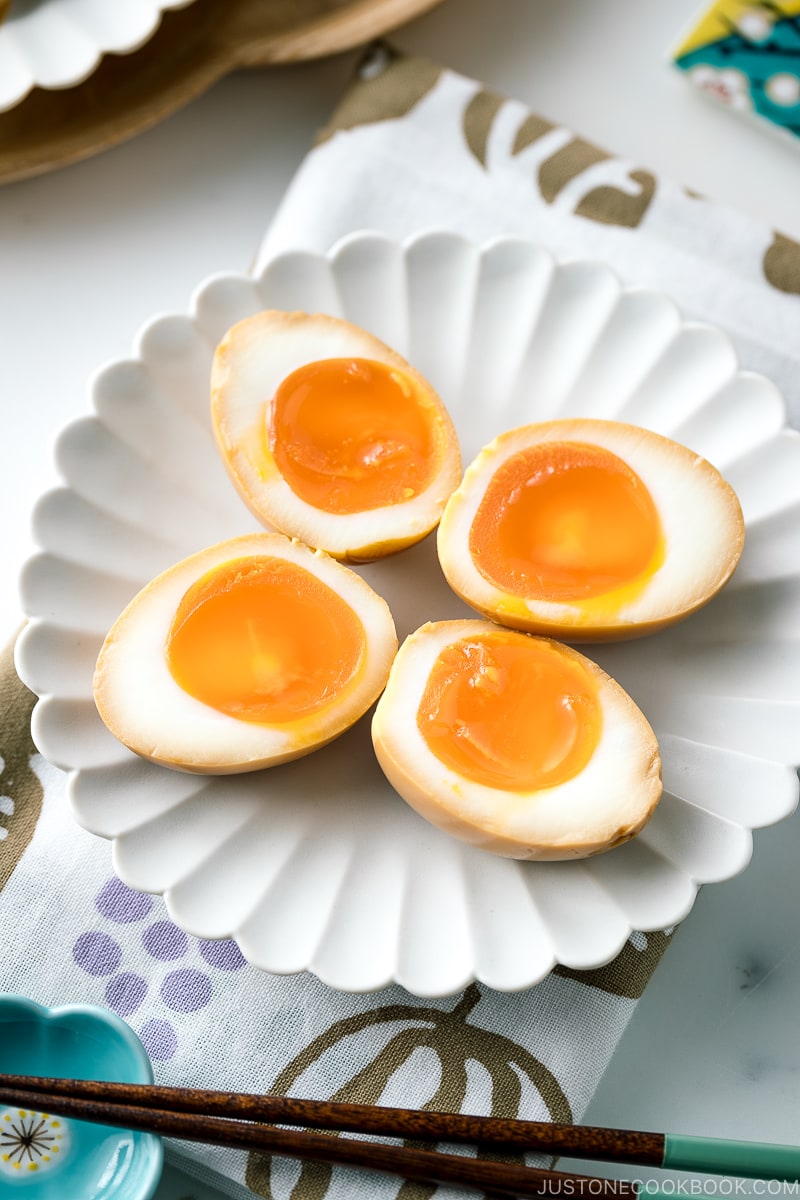
A great bowl of ramen is built upon a few significant components. There’s hot broth, fresh-made noodles, and the toppings. As far as the toppings go, no one can resist a perfectly cooked ramen egg that sits alongside sliced chashu, a sheet of nori, and green onions. Some would even argue that ramen egg is a must!
When done right, ramen egg is creamy, silky, full of umami, and ready to enrich and intensify your ramen enjoyment. The truth is, ramen eggs are not just for ramen alone. You can enjoy these delicious eggs anytime, in many different ways!
Table of Contents
What Are Ramen Eggs?
Ramen eggs are Japanese soft-boiled eggs known for their custardy, jammy, runny yolk, and umami flavor. They are marinated overnight in a sweetened soy-based sauce. In Japan, we call these marinated eggs Ajitsuke Tamago (味付け玉子), short for Ajitama (味玉) or Nitamago (煮玉子).
While these eggs are excellent on ramen, they are also fantastic to enjoy as a side dish, snack, or packed in a bento. Don’t limit yourself there! You can even add them to salads or sandwiches. That’s the magic of ramen eggs. They are so good and amazingly versatile.
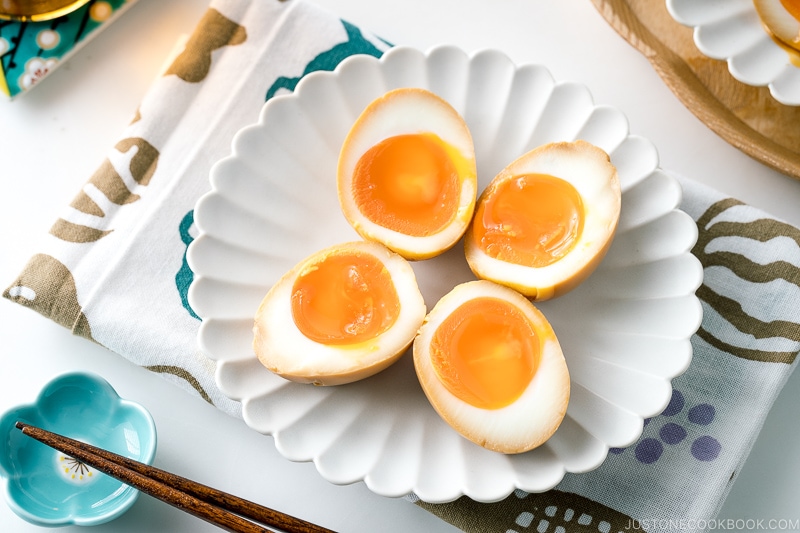
Ingredients for Ajitsuke Tamago
Five ingredients are all you need, and you’ll be surprised at how easy it is to make ramen eggs at home.
- Good quality eggs, especially if you plan to make soft-boiled eggs
- Soy sauce
- Mirin
- Sake (or water)
- Sugar
For the marinade, you can create your version with additions (such as chili flakes for spice, etc), but let’s stick with the basics.
What changed from the 2011 Recipe?
Some of you might be familiar with the original recipe I shared in 2011. In the past, I used water instead of sake. However, for food safety reasons, I started making my ramen eggs with sake and like this version much better.
Why sake? The amino acids in the fermented rice wine enhance food flavors by adding hints of sweetness and umami, which makes the eggs taste better. In case you’re wondering, we would boil off the alcohol from the sake before marinating the eggs so it’s perfectly safe for kids to consume.
As part of the refinement, I also added a bit of sugar. To put the old and new recipes to the test, I had my family try out the two versions multiple times, and they concluded that the winner goes to this updated recipe. For those who can’t consume alcohol, you can still use water.
How To Make the Best Ramen Eggs
You can find the detailed recipe below, but here’s a quick overview.
Jump to Recipe- Make the marinade.
- Cook soft-boiled eggs.
- Marinate the eggs overnight.
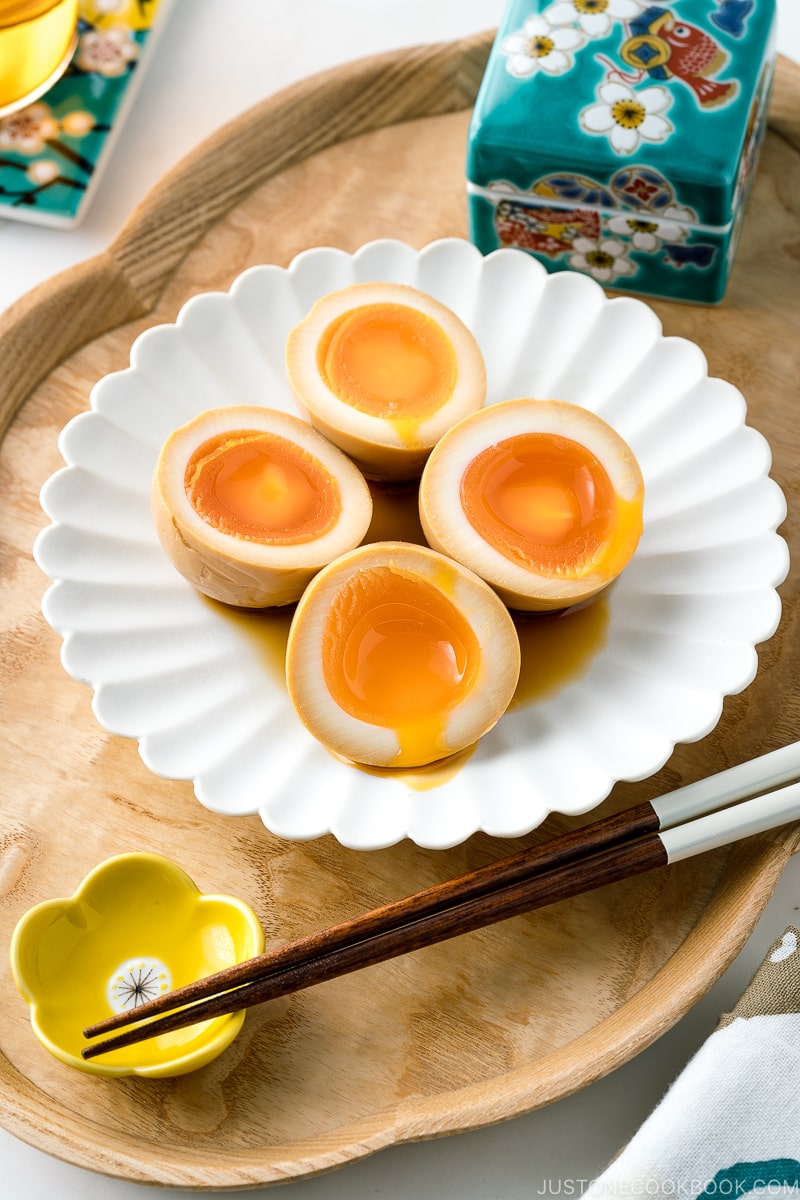
Cooking Tips
Tip #1: Cook the marinade
To make the marinade, I highly recommend cooking it for 1 minute after boiling. This ensures the sugar dissolves and the alcohol evaporates, leaving only the natural umami and sweetness in the sauce.
Tip #2: Use refrigerated eggs
Using a fine-mesh sieve/strainer, gently lower your eggs straight from the fridge into the (already) boiling water and lower the heat slightly to a simmer.
Tip #3: Cook 7 minutes from the first egg in boiling water
Start setting the timer for 7 minutes from the first egg submerged in boiling water. It takes about 30 seconds or less to submerge all four eggs (set the timer for 6 minutes and 30 seconds if you start the timer when you finish submerging all the eggs. Little adjustment matters!)
I use large American eggs for this recipe, and knowing that egg sizes vary in different parts of the world, you might need to adjust the cooking time slightly.
Tip #4: Shock the eggs in ice water
Shock the boiled eggs in ice water immediately and let them chill for at least 15 minutes. I use the same ice water to dip the boiled eggs a few times when peeling them. Water goes into the gap and helps peel easily.
Tip #5: Marinate the eggs overnight
Marinate the ramen eggs for just a few hours or overnight. I can make ramen the next day while the eggs stay marinated in the fridge, waiting for their appearance.
How To Store Ramen Eggs
Soft-boiled eggs should be consumed in 3-4 days. Keep the Ajitsuke Tamago or ramen eggs in the refrigerator at all times. Use a clean utensil to take out a marinated egg, if you continue to marinate the rest of the eggs. I’d take out the ramen eggs after soaking them overnight as I don’t want my eggs to be too salty. You can marinate for up to 2 days at most, but I recommend removing from the marinade after that.
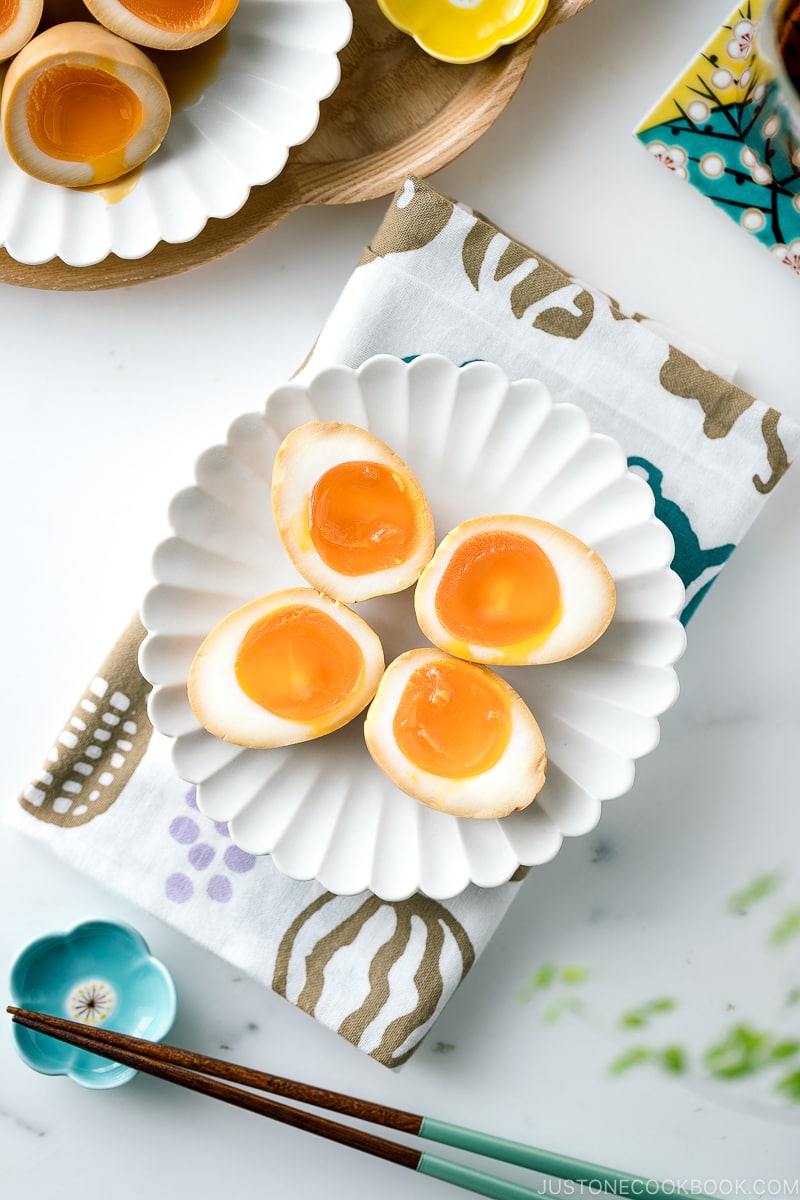
How To Serve Ramen Eggs
I hope you’ll try this recipe because it can make your day better. Here are my absolute favorite ways to enjoy the eggs.
- Serve with Miso Ramen
- Serve with Vegetarian Ramen
- Serve with Tsukemen (Dipping Ramen Noodles)
- Serve on Avocado Toast
- Serve with Japanese Curry
- Pack in Bento Box
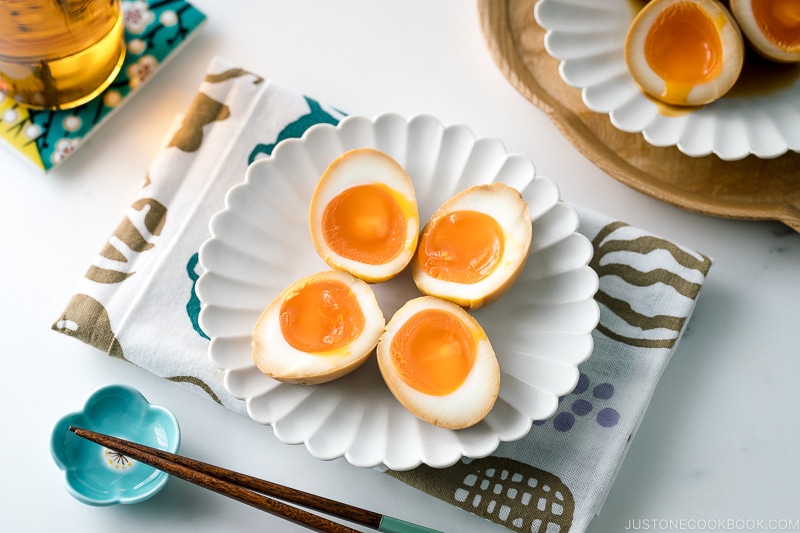
Wish to learn more about Japanese cooking? Sign up for our free newsletter to receive cooking tips & recipe updates! And stay in touch with me on Facebook, Pinterest, YouTube, and Instagram.

Ramen Eggs (Ajitsuke Tamago)
Video
Ingredients
- 4 large eggs (50 g each w/o shell) (refrigerated; use slightly older eggs, which are easier to peel)
Instructions
- Before You Start: Please note that this recipe requires a marination time of 8 hours or overnight. Gather all the ingredients.
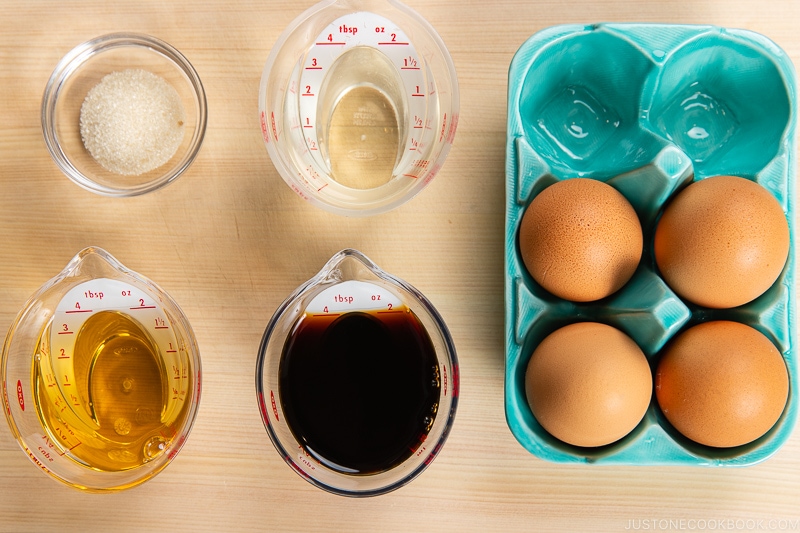
To Make the Marinade
- In a small saucepan, combine all the ingredients for the marinade: ¼ cup soy sauce, ¼ cup mirin, ¼ cup sake, and 1 tsp sugar.
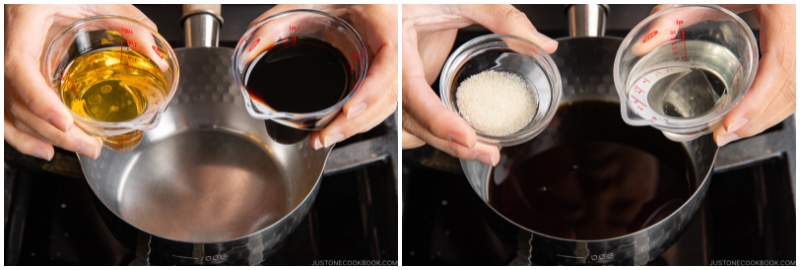
- Bring it to a boil and whisk it a few times to let the sugar dissolve completely. Once boiling, lower the heat and simmer for 1 minute. Turn off the heat. Set aside to cool completely.
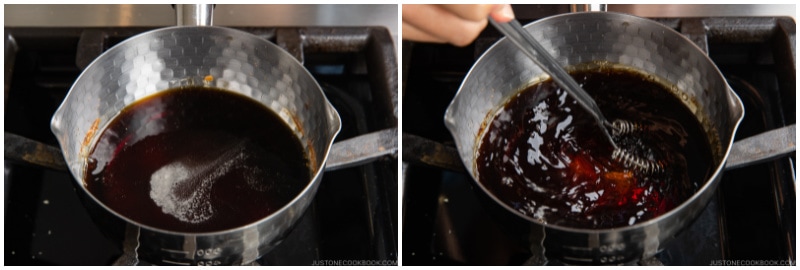
To Make the Soft-Boiled Eggs
- Add 4 cups (1L) water (for 4 eggs) to a medium saucepan and bring it to a boil. There should be enough water to cover the eggs by at least 1 inch (2.5 cm). Once at a full boil, take out 4 large eggs (50 g each w/o shell) from the refrigerator. Carefully and gently lower one egg at a time into the boiling water with a mesh strainer/skimmer or a ladle. When you add the first egg, set a 7-minute timer. You can cook them 6 to 6½ minutes for a runny egg yolk and 8 to 9 minutes for a custard-like egg yolk.
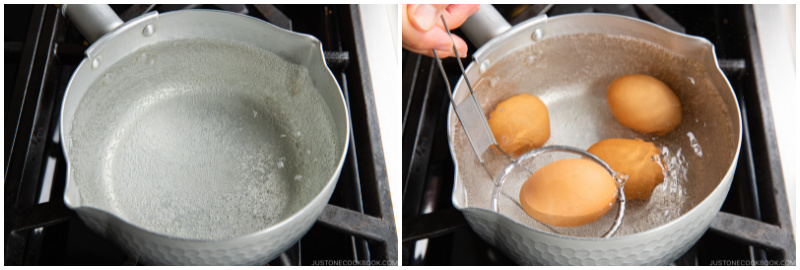
- Once all the eggs are in the saucepan, lower the heat to maintain a gentle boil. Make sure the water is simmering, but not bubbling so strong that the eggs bounce around. If you want your egg yolks to be centered, gently rotate the eggs with chopsticks once in a while for the first 3 minutes.
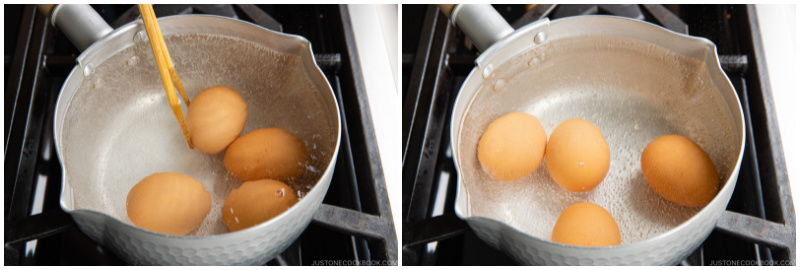
- After 7 minutes, immediately take out the eggs and shock them in iced water for 15 minutes.
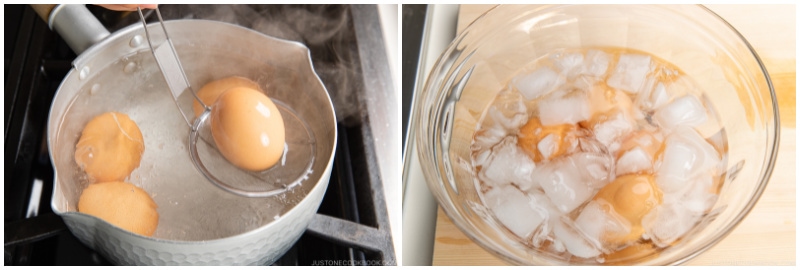
- Once the eggs are completely cool, gently crack the shell at the wide bottom end of the egg and start peeling it vertically toward the pointy top. Dip the egg in the iced water a few times to help with the peeling. Once you peel one section vertically, the rest of the shell comes off easily.
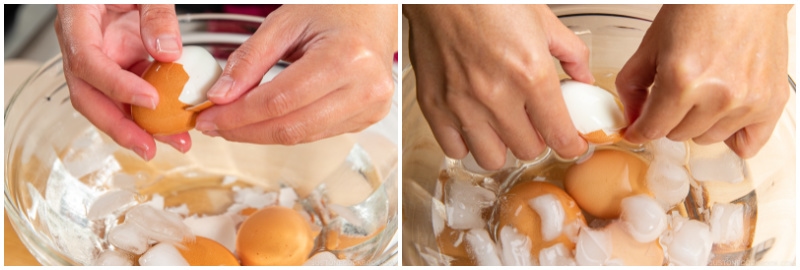
To Marinate the Eggs
- Place the eggs in a plastic bag and add the marinade to the bag. Why am I recommending a plastic bag? With a plastic bag, we don‘t have to use a lot of marinade to submerge the eggs. This marinade is used only one time for food safety reasons, so it’s most economical to prepare no more than the amount you need. If you use a container instead of a bag, it requires more marinade to submerge the eggs.
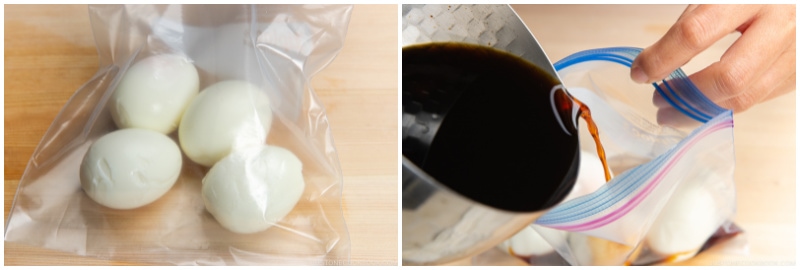
- Remove the air from the bag and use a clip or rubber band to seal the bag right above the eggs. This way, the eggs are completely submerged in the marinade. Refrigerate for 8 hours or overnight. You can rotate the eggs occasionally if you like.
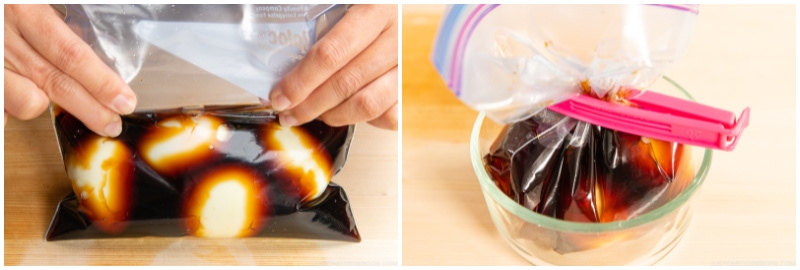
To Serve
- Remove the eggs from the marinade and cut them in half lengthwise to serve. Use a piece of string, fishing line, or cheese cutter (that‘s what I used here) to cut the eggs in half cleanly. Enjoy the Ramen Eggs in bento, as a ramen topping, or as a snack sliced in half and sprinkled with furikake (rice seasonings) and shichimi togarashi (Japanese seven spice). If you want to warm up the eggs, soak the bag in warm water to bring up the temperature faster.
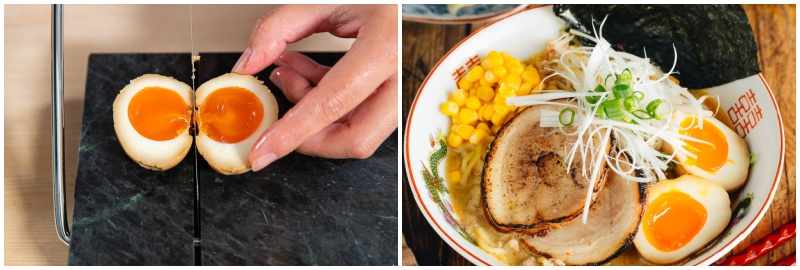
To Store
- Keep the Ramen Eggs refrigerated at all times. Do not freeze as the texture of eggs changes when frozen (with the exception of tamagoyaki). The ramen eggs will get saltier the longer they marinate, so take them out from the marinade after 12–24 hours (depending on your preference). Enjoy the ramen eggs within 3–4 days if your eggs are soft-boiled. If your eggs are hard-boiled, you can keep them in the refrigerator for up to a week. For food safety reasons, I do not recommend reusing this marinade with new boiled eggs. You can repurpose this marinade as a seasoning sauce for your stir-fried or simmered dishes but use it soon.
Notes
Nutrition
Editor’s Note: This post was originally published on September 14, 2014. It has been updated with new images, video, and blog content in September 2021.
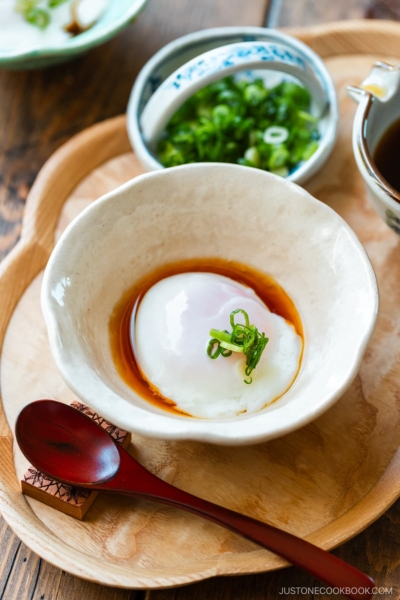
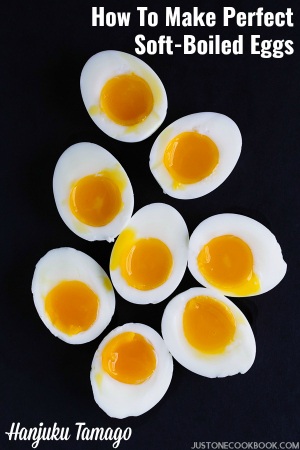
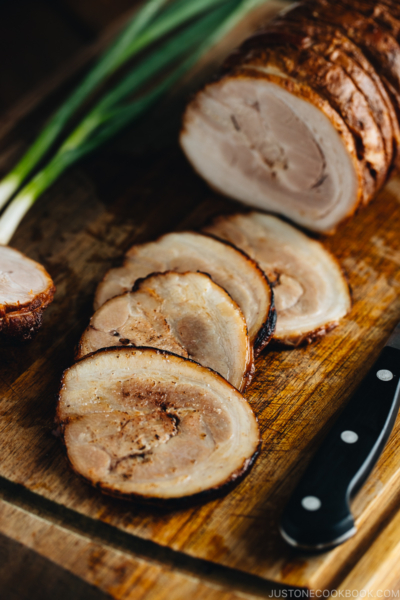
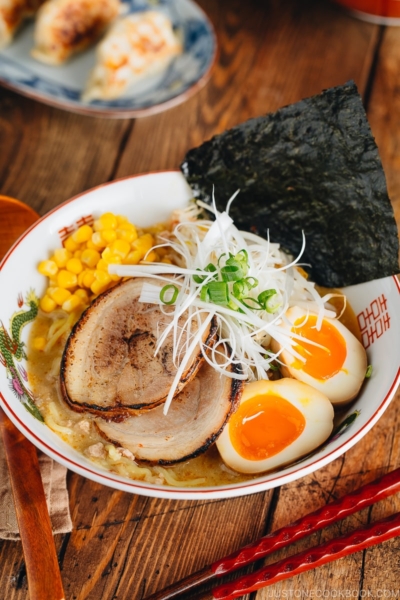
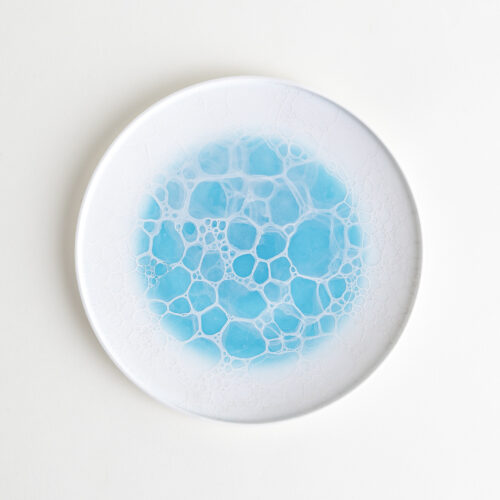
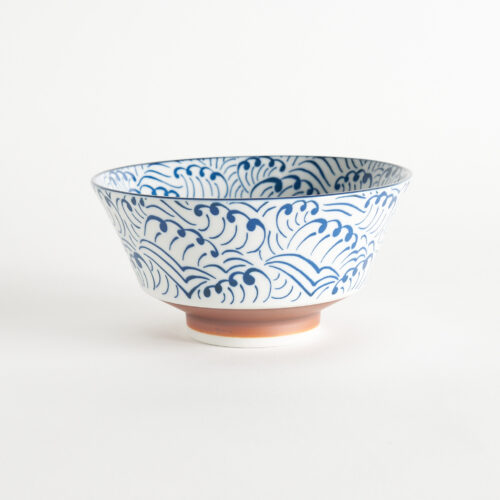
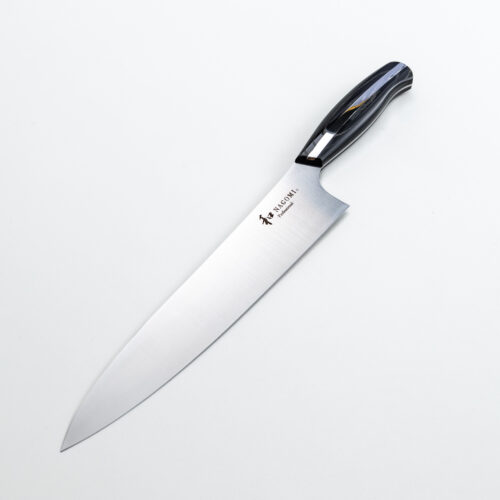
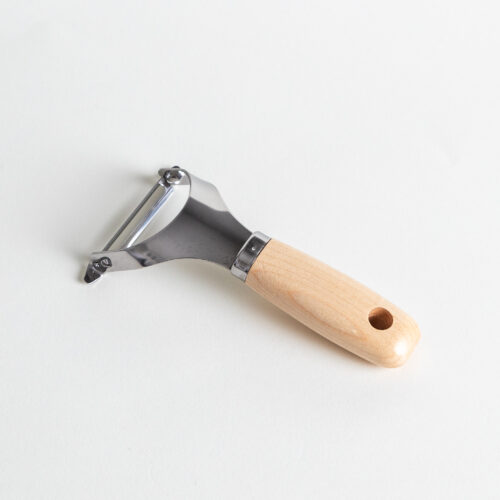

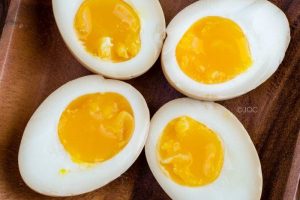
Best ramen egg recipe!!!! I have made this recipe plus your miso ramen soup together. These two recipes are better than many ramen shops I’ve tried. Thank you so much!!!!
Hello there! Aww. We’re so glad you enjoyed Nami’s recipes!
Thank you for rating the recipes. Happy cooking!🤗
I made these yesterday, along with your recipe for chashu pork. The eggs are ridiculously good, I could happily eat these every day for the rest of my life.
The chashu is even better, it’s unbelievable how tasty and tender it is.
My wife thanks you. My neighbour thanks you. My tummy thanks you!
Martin
Hi, Martin. Aww. We are so happy to hear you and your family enjoyed Nami’s recipe!
Thank you for trying her recipe and providing such great reviews. It made our day!
Hello! I will be trying out making Japanese recipes before my husband and I go to Japan this coming October. I was wondering, you say the marinade can be repurposed in something simmered and I was wondering if you could give examples for that? Thank you!!
Hi Gina! How exciting that you’ll be visiting Japan soon! 😊
You can use this marinade for various dishes and adjust the flavor to your liking by adding more sugar or soy sauce. Just make sure to cook the marinade. Here are some links that might be helpful:
https://www.justonecookbook.com/simmered-taro/
https://www.justonecookbook.com/okra-ohitashi/
https://www.justonecookbook.com/slow-cooker-chicken-wings/
We hope this information is useful for you!
Hi! i got a similar question. How long or how often would you say the marinade could be reused?I mean, the marinade on its own practically should never go bad…
Hi Jasmin, Once you marinate the eggs, we recommend using them on the same day.
More details are provided at the end of the recipe card.🙂
I made it this morning to accompany clam ramen tonight. I thought the flavor was good even though it was not an 8 hour soak. Jammy egg texture was perfect. Eggs were easy to peel in very cold iced water.
Hi Doreen! Thank you so much for your kind feedback!
We are so happy to hear you enjoyed Nami’s recipe. Happy Cooking!🥰
Am I doing something wrong? I followed this recipe several times and although the egg yolk is already custard-like, the egg white is sooooo soft that it the egg is impossible to peel without breaking the egg. I just spent 1h 30min peeling 4 eggs, all kinda broken. They are medium-sized European white eggs. Does this only work with brown eggs for some reason? I’m so sad 🙁
Hello there! Thank you so much for trying Nami’s recipe.
The egg yolks coagulate at a lower temperature than the egg whites, so the heat level could be too low.
At the next attempt, try to bring up the heat level a bit.😉
We hope this helps!
Try poking a small hole in the Bottom of the Egg. Just one where the airpocket is. The Boiling water getts sucked between the peel and the skin and it will be much much easier to peel!
I made them recently and they turned out so good! I did as recommended and cooked the eggs for 6,5min and the yolk was runny as I hoped, which in turn made it super delicious. And the recipe was so easy to follow so even I had no trouble following it!
Hi, Ula! We are delighted to hear you are pleased with the egg’s outcome!
Thank you very much for trying Nami’s recipe and providing such great reviews.
Happy cooking!
Hi Nami, I’ve tried this recipe many times and my eggs always come out undercooked. The eggs I have could be bigger than the ones in the recipe. From your experience, should increase the heat or let the eggs cook longer? Thank you very much!
Hello, Shirley. Thank you very much for trying Nami’s recipe!
We recommend extending the cooking time. Try nine minutes. We hope you like the result. 🙂
This worked perfectly! I stirred gently as recommended to center the yolks. Have them marinating now!
My trick for easy peel: dunk them briefly in the ice bath, then tap them all around and peel off the bottom of the shell BEFORE you let them sit in the ice bath. That way water has time to get between the egg and the shell.
Hello, Caleb! Thank you so much for trying Nami’s recipe and sharing your easy peeling trick with us! It sounds fantastic! 🤗
Are we able to use cooking sake instead of sake?
Hello, Jess. Thank you for trying Nami’s recipe.
You can use cooking sake. However, because it contains salt, it may taste salty if you follow the recipe exactly. Please feel free to adjust the flavor to your liking.
Best ramen eggs. Easy instructions. Easy to make and perfect. I have made miso soup or miso ramen for awhile. Came across this recipe a few years ago and have never looked back. My dad specifically requests them. I made 8 eggs the other day just for him!
Hello, Bethany! We are glad to hear that you and your father are happy with Nami’s recipe.
Thank you so much for taking the time to rate her recipe. 🙂
Hi, could you advise how much vinegar and sugar to put in the water when we boil the egg? Thanks
Hello WeiLing, Thank you for trying Nami’s recipe!
To cook the eggs, try combining 1 tablespoon vinegar and 1 tablespoon salt (not sugar) with 4 cups of water.
We hope this is helpful.🙂
my “easy to peel” eggs trick: gently place room temperature eggs into plain boiling water using a slotted spoon. Turn heat down to simmer, or eggs bounce/jump around in the pan causing cracks. Cook for desired length of time. While eggs are cooking, fill a bowl that will hold all the eggs (with room to spare) with ice and water. When desired cooking time has been reached (never more than 9 minutes) turn off the heat. Remove eggs from pan and immediately dunk into ice bath. Leave all eggs in ice bath for 5-10 minutes. The ice bath prevents the green ?sulfur? ring that forms around overcooked egg yolk.
heh. I see we have the same technique – I saw all those people saying “I use vinegar too” … thought you were the one who started that LOL /facepalm — I’m going to go set some eggs out so I can make this recipe later 🙂
Hello, Margorie! Thank you for sharing your tricks! 😊
Thank you for this recipe! I have always thought that making ramen eggs were really complicated but this was super easy to follow and the eggs turned out great!
Hello, Tiffany! Yes! It’s very simple to make a tasty Ramen Egg! Right?
We’re glad you’re enjoying it! 😊